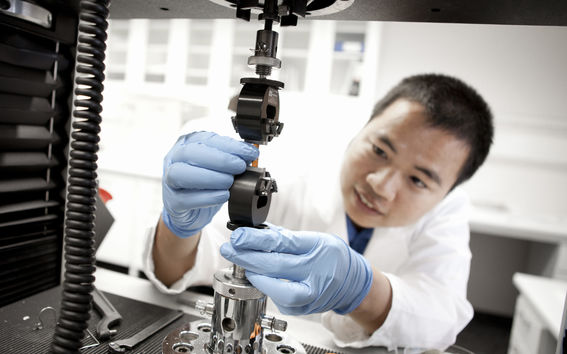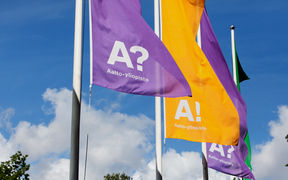Studies

Bachelor's programme
There is one English-language Bachelor's degree involving the Department of Applied Physics: The Bachelor's programme in Quantum Technology. Courses are also available for students in other engineering degree programmes both in the School of Science and in the other schools. The physics laboratory experiments are an essential part of undergraduate studies. The department’s research groups provide topics and supervision for bachelor’s theses on various topical fields of physics.
The Applied Physics Department provides comprehensive undergraduate courses in basic physics for Quantum Technology and Engineering Physics students, covering quantum physics, applied mathematics, programming, engineering, teamwork, and communication. For Bachelor's programmes in Finnish and Swedish, visit their respective webpages.
The Bachelor's Thesis and Seminar is a 10 cr study module that is a compulsory part of the Bachelor's degree. The department’s research groups provide topics and supervision for bachelor’s theses on various topical fields of physics.
Master's programme
The Master's Programme in Engineering Physics offers two majors: Materials Physics and Quantum Technology, and Advanced Energy Technologies. The majors consist of a core component and a flexible choice of courses selected by the student. The core courses cover important topics for engineering physics and methods from computational, theoretical, and experimental physics. The core content of the programme also allows for a more detailed focus on certain subjects.
The rest of the studies have a very flexible structure, and provides the student with the possibility of focusing in physics, nanoscience, energy studies, or designing a more cross-disciplinary content for the major. The student can also choose to complete a minor subject, or complete a more extended major.
The major aligns with the Applied Physics Department's focus on materials physics and quantum technology. In materials physics, the emphasis is on discovering nanoscale materials, exploring electronic structure, nanomagnetism, and more. Quantum technology studies cover advanced quantum mechanics, nanoelectronics, and quantum computing architectures. The programme is overseen by Professor Mika Sillanpää.
The program focuses on clean energy solutions, offering analytical skills for diverse topics like energy materials, systems, and renewable technologies in response to climate change and green economy challenges. The programme is overseen by Professor Andrea Sand.
Students’ special assignments are an essential part of the master’s studies. The research groups at the Department of Applied Physics provide topics and supervision for special assignments, which are often completed during a summer internship at the department.
The company internship is a course designed between the student, a designated advisor at a company, and a professor within the physics department. The aim of of the course is to initiate and complete a project within the company during a 12-week timeframe.
The Department of Applied Physics employs a large number of teaching assistants on its courses. Most assistants are graduate students, but the department also hires interested undergraduates to help with these tasks. In case you are interested in becoming a teaching assistant and/or being included in relevant mailing lists, please send an email of your teaching interests/experience together with on extract of your study register to assistants-physics@aalto.fi. Salary level depends on details, but is roughly 30-40 euros per hour with extra bonuses from various tasks related to teaching.
Doctoral programme
The Department of Applied Physics is highly committed to doctoral researcher training of which the research groups bear the main responsibility. The postgraduate students have a large flexibility and responsibility in the postgraduate studies. The doctoral studies are based on top-level scientific research.
The department has roughly 25 research groups which offer PhD research positions in topical experimental, theoretical or computational projects. Graduate training networks at the School of Science provide also training in terms of courses, summer schools, and workshops.
For the course studies in the doctoral education, it is strongly recommended that the students select courses directly relevant and closely related to their research field. A large number of graduate level lecture courses are given at the department and, in addition to the lecture courses, it is recommended that postgraduate students participate in summer schools and workshops in Finland and abroad.
Workshops and schools are credited in doctoral studies. Also acting as an assistant in departments physics courses is awarded by credit points. It is also possible to obtain credits by self-study of relevant books and review articles.
The majority of the doctoral programme consists of candidates' research carried out as part of their individual research plans. View the full list of research groups in the Department of Applied Physics via the link below.
The midterm review is for all Department of Applied Physics PhD students enrolled with an MSc degree after January 1st 2013. It is compulsory for full-time students, and encouraged for part-time students (the deadlines are scaled accordingly in the latter case).
The midterm review must be undertaken no later than 18 months after starting the PhD. Note that this is similar to the deadline to get the Aalto bonus for completing your credits, so you may want to do the midterm a little earlier.
Research excellence
The Department of Applied Physics is recognised for its research excellence through numerous national and international external funding awards.

Stakeholder Advisory Board
The Stakeholder Advisory Board for physics students has been established in 2021. The purpose is to enhance the connection between physics students and private enterprises - how physics studies lead to interesting jobs and careers outside academia. As of now, we organize get-togethers with students, excursions to the companies, and visitor lectures where the companies can tell about their activities in research and development.
The Advisory Board consist of the following companies and experts. These cover a board scope of enterprises, also beyond a typical physicist's profile, ranging from very large companies to fresh spin-offs:
VTT: Sanna Arpiainen
IQM: Juha Vartiainen
Nordea: Jukka Sinisalo
Boco IP Oy Ab: Thomas Carlsson
Kaiku Health: Joel Lehikoinen
Granlund: Anna Korolyuk






